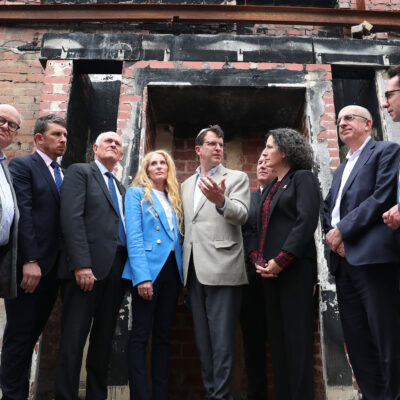Opinion
Words on fire: Thoughts on Parshat Ve’etchanan
“Take utmost care and watch yourselves scrupulously,” Moses advised in this week’s Torah reading Ve’etchanan, “so that you do not forget the things that you saw with your own eyes and so that they do not fade from your mind as long as you live. And make them known to your children and to your children’s children” (Deuteronomy 4:11-12). The foundational experiences of becoming a nation may fade over time so Moses asks that his people – our people – bear witness to what they have gone through and share it with the power of story.
One of those indelible experiences was the giving of the Torah at Sinai. Moses has specific details burnished in his mind about that nascent time in Israelite history: “You came forward and stood at the foot of the mountain. The mountain was ablaze with flames to the very skies, dark with densest clouds. God spoke to you out of the fire; you heard the sound of words but perceived no shape — nothing but a voice” (Deut. 4:11-12). Moses’ description is rich and sensory, as if to say, these are “the things you saw with your own eyes.” Never forget them.
The Jerusalem Talmud offers an incredible commentary on how this specific scene and verse was passed from father to son. Elisha, the Talmud’s famous heretic, was extolling his father Abuya with the story about the day of Elisha’s brit, his entrance into the covenant. Abuya was a wealthy man who invited all the important people of Jerusalem to this event. They were in one room feasting, dancing and clapping. In the next room, the sages Rebbe Eliezer and Rebbe Joshua were studying Torah.
The rabbis said to each other, “While they are occupied in theirs let us be occupied with ours.” They studied an array of subjects with such intensity that, “fire descended from Heaven and surrounded them.” Abuya ran next door and chastised the pair: “Why do you come to burn down my house?” The sages were unapologetic. They exclaimed, “The words were joyful as at their giving on Sinai.” Since the words of Torah were given with fire, they told Abuya that they received them with fire. They then cite our sedra’s verse: “The mountain was ablaze with flames.” Abuya was so impressed with the power of Torah that he said he would dedicate his new son to the Torah.
The message of the story is clear. Words given in fire are received in fire. The passion of study and learning attracts, magnetizes, and burns brightly.
Rabbi Jonathan Sacks in his 1992 book Crisis and Covenant, teaches the power of the Torah’s words is singular to our faith: “For Judaism God is to be found not in a person or a place but in words, the words of the Mosaic books, Torah in its narrow sense. Neither Moses, the greatest of the prophets, nor Sinai, the place of revelation, have intrinsic sanctity. They were the vehicles of revelation, not its embodiment. That description belongs to Torah alone.”
The metaphor of a burning mountain as a symbol of intellectual charisma reminds us that if the words we use are on fire, they will be received with fire. When we are passionate about a cause or an idea, we can generate passion in others. When we are unmoved by our own words, so too will those hearing them be unmoved. Leaders understand this. Followers want charisma in their leaders. They want to feel inspired, stimulated, and motivated.
In “What is Charismatic Leadership?,” (May 17, 2022), Hannah L. Miller describes charismatic leaders as “charming, caring, motivational, supportive, infectious, and warm.” She believes they have unusually good emotional intelligence, confidence and potent energy. Their charm and likeability resonate with others and help drive results. This is especially important, Miller contends, in companies with a strong social cause: “the leader drives people to stay positive, upbeat, and keep fighting the good fight.”
There are dangers, though. Fire burns. Jim Collins in his book Good to Great discusses the liability of charisma. The passion of a leader for an idea or a strategy can blind him or her to other opinions. Egos and tempers can be high when followers do not achieve the desired results. Followers may not buy into the prevailing zeitgeist with the same level of commitment. This can lead to burnout. Sometimes passion can falsely compete with content or real work. Words on fire become meaningless if they are not backed up with outcomes. In their article “Falling over Ourselves to Follow the Leader” (Journal of Leadership & Organizational Studies, 14:1, 2007), Igor Kotlyar and Len Karakowsky write, “The prevailing belief is that charismatic leaders always bring out the best in their followers and help teams perform beyond expectations.” This is not always true. “What we discovered, in contrast, is that a less flamboyant, no-frills leader can be more successful at engaging executive teams in brainstorming while keeping emotions and ego in check.”
In our sedra, Moses challenged the Israelites to hold fast to the visual image of a burning mountain so that the words of Torah would continue to simmer within them. He was also telling them how to transmit God’s law to the next generation. Words given in fire are received in fire. So was it then. So is it now.
What words, advice, or events are burnished in fire within you that you have passed down?
Erica Brown is the vice provost for values and leadership at Yeshiva University and director of its Rabbi Lord Jonathan Sacks-Herenstein Center.

 Add EJP on Google
Add EJP on Google









